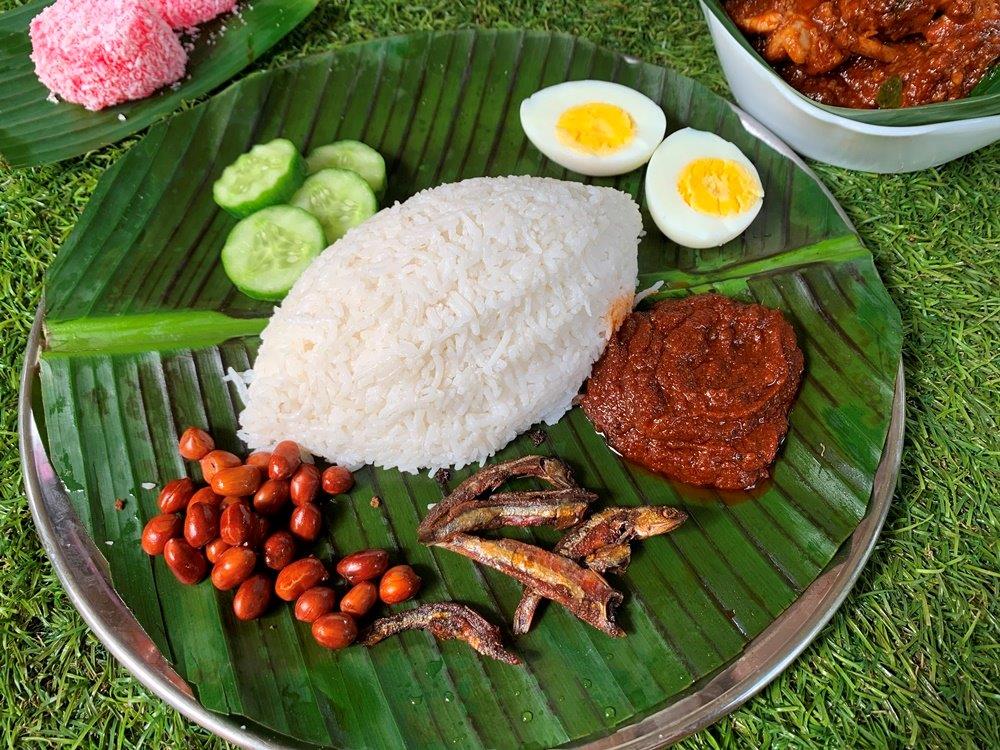
In this think piece, Diaspora Youth Intern Jessica reflects on her personal journey of reconnecting with her Malaysian heritage through the diverse and delicious cuisine of her home country and sits down with Malaysian café-owner Ain Zaini to discuss Malaysian cuisine…
Malaysia to Germany – handling culinary culture shock
Malaysian cuisine is a genuine culinary marvel, a harmonious blend of Malay, Chinese, Indian, and Thai influences among others. This fusion has given birth to a repertoire of dishes that have left a lasting mark on my taste buds. The richness of flavours, versatility of ingredients, and colourful presentation of dishes have made Malaysian cuisine a true celebration of diversity. The diverse Malaysian cuisine largely reflects the country’s mixture of ethnic communities.
As a member of the Malaysian diaspora in Germany who had early exposure to Malaysian cuisine, I often find myself reminiscing about the diverse and delicious world of Malaysian cuisine. The mere thought of dishes like Roti Canai, Tom Yum Soup, Nasi Goreng and Char Siu Bao evokes a rush of nostalgic memories and a longing for the familiar flavours of my childhood.
When I moved to Germany at the age of seven, my perception of food was challenged by the contrast between German and Malaysian cuisines. German cuisine, with its schnitzels, sausages, bread-based and cheesy dishes, initially felt foreign to me. So began my culinary journey of recreating Malaysian dishes and seeking solace in Asian markets and restaurants where I could indulge in well-known flavours…
I quickly realised that food is a beautiful way to reconnect with my country of heritage. It is a way for me to stay close to my roots and cherish memories, as it provides me with a sense of cultural comfort and unmistakable familiarity. In this article, I would like to introduce a little of the history of Malaysian cuisine and its hero dishes, and reflect on how food can be a connector to cultures of heritage for diaspora communities. To wrap this reflection up, I spoke to a Malaysian café owner in Cologne, to see how something which has been personal for me, was a source of professional inspiration for her.
If you are hungry at the end, your local Asian supermarket will have all the ingredients you need to enter the wonderful world of Malaysian cooking!
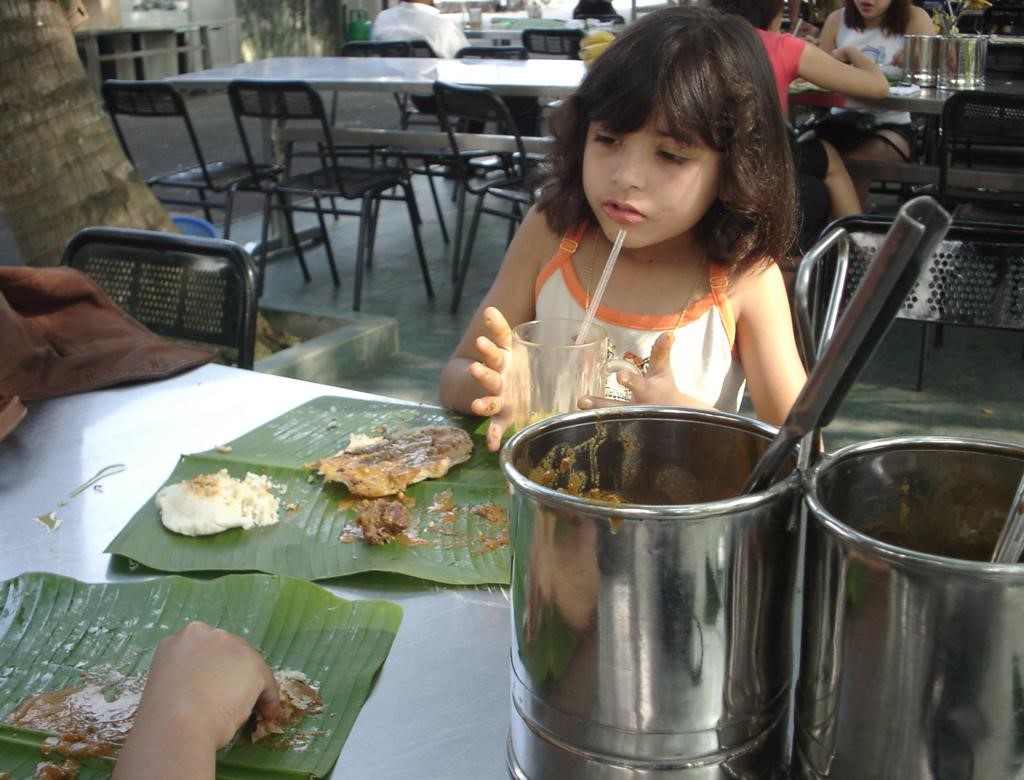
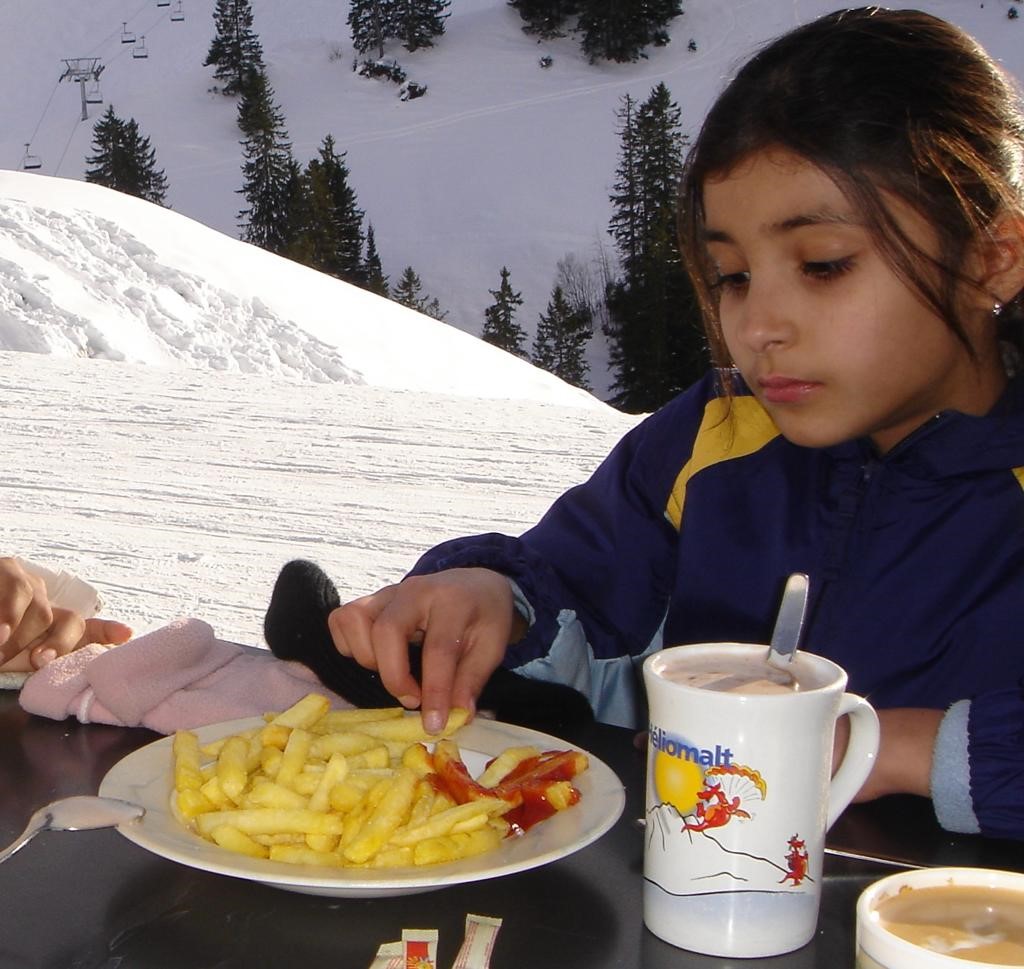
What is the history of Malaysian food culture?
To understand the melting pot of Malaysian cuisine, it is important to have a little background information on Malaysian food culture, its origins, and get to know some of its hero dishes.
The roots of Malaysian cuisine can be traced back to ancient times. Indigenous communities, such as the Orang Asli (“Original People”) and the Dayak (native people of Borneo), relied on the abundant resources of the rainforest and rivers, using ingredients such as wild game meat, herbs, and freshwater fish in their traditional dishes. Malaysia’s peninsula landform and key position along ancient maritime trade routes brought various foreign influences to its shores: Indian and Arab traders introduced spices such as turmeric, cumin, and cardamom, while Chinese traders introduced their culinary techniques and ingredients such as soy sauce and noodles. These early exchanges laid the foundation for the rich diversity that characterises Malaysian cuisine today.
The Malay community, also known as “Bumiputera”, constitutes 61.8% of the total population of approximately 31 million and is the largest ethnic group in Malaysia. The Malay have significantly impacted the development of the country’s cuisine. Malay cooking techniques such as grilling and stewing form the basis of many iconic Malaysian dishes. The most popular dish in Malaysia – its national dish – is Nasi Lemak. Nasi Lemak translates to “rich rice” as the rice is prepared with coconut cream steamed with fresh Pandan leaves. Nasi Lemak showcases the essence of Malay cuisine through its harmonious blend of flavours and textures: fragrant coconut rice, sambal or spicy chilli paste, local anchovies (“Ikan Bilis”), peanuts, slices of cucumber, boiled eggs…delicious!
Another icon from the Malay community is Beef Rendang, which is often served at special celebrations and ceremonial occasions. This slow-cooked meat dish comes with an aromatic sauce infused with toasted coconut (“Kerisik”), kaffir lime leaves, and lemongrass. Rendang is one of the most recognisable Malaysian dishes, renowned for its tender meat and complex flavours; it has become a staple not only in Malaysia, but across Southeast Asia.
The arrival of Chinese immigrants in Malaysia in the 14th century brought new culinary customs which left an indelible mark on Malaysian cuisine. The Chinese influence can be seen in the widespread consumption of noodles and soups, stir-frying techniques, and the art of dim sum. Char Kuey Teow, a beloved street food favourite in Penang, features stir-fried flat rice noodles with a medley of ingredients like shrimp, bean sprouts, eggs, soy sauce, and Chinese sausage prepared in a hot wok. This dish exemplifies the Chinese influence on Malaysian cuisine, showcasing the skillful blending of flavours and textures, yet this dish is distinctly Malaysian.
Indian traders and workers introduced the vibrant flavours of Indian cuisine to Malaysia. This influence can be seen in the widespread use of spices, the love for curries and the art of bread-making. Roti Canai (equivalent to the Indian Paratha), a soft and crispy flatbread served with different curries, is a testament to our Indian culinary heritage; it has become a beloved breakfast and snack option in Malaysia. Nasi Biryani, a spicy rice dish cooked with meat, fish, or vegetables, also reflects the influence of India on Malaysian cuisine. The aromatic blend of spices and layered flavours makes biryani a cherished dish especially during festive events.
This rich culinary history is tied to the diasporas within Malaysia. Now, for the Malaysian diaspora I am part of, food is also a shared pride and heritage, but what does this mean beyond searching for the right ingredients cooking family recipes…
How does food help us reconnect?
Malaysian cuisine has a lot to offer which, in my experience, makes the longing for it even greater when relocating to another country. This begs the question: How can food help diaspora communities connect with their country of heritage and why is it important? I see several ways in which traditional food and cuisine contribute to strong diasporas.
Food and memory
Food can evoke memories of cherished celebrations, festivities, social gatherings, and take us back to a time and place that feels distant and yet close simultaneously. This sense of nostalgia and cultural remembrance is vital for constructing our cultural identity as it roots us in culture, traditions, and norms that form our sense of belonging, connecting us through sensory experiences when we prepare, smell, taste, and eat food.
Culinary cultural identity
I would go so far as to say that eating traditional and regional food shapes our cultural identity. In this regard, food and languages have some elements in common, as both enable cultural exchange. Food and language evolve over time, reflecting influences of societal, geographical, and historical factors. They both bear the imprints of globalisation, colonisation, and migration. Languages absorb contemporary vocabulary and linguistic structures, whereas food intricately melds flavours, cooking techniques, and ingredients from various culinary traditions over time. This results in a sense of fluidity in cultural identities whilst helping shape and construct that cultural identity.
Eating brings people together
It is common knowledge that sharing food with our families, friends, and communities is a community-building activity, and universally so. Food is far more than a source of nourishment, it creates connections that transcend borders and generations. Food acts as a communal force, fostering a sense of belonging and unity within diaspora communities. It becomes a shared experience, a source of pride and cultural exchange, enabling individuals to forge connections and find common grounds, building – and maintaining – the foundations of community.
Intergenerational learning
Through the fusion of culinary traditions, both within and outside the heritage country, diaspora communities engage in intergenerational learning, passing down knowledge whilst also reinventing recipes (“fusion”’) to reflect their unique experiences. Food acts as a bridge between cultures, fostering understanding and appreciation while allowing the diaspora to maintain a deep and meaningful connection with their country of heritage.
Preserving cultural heritage
By passing on traditional recipes and cooking techniques, food becomes a tangible link to the past, ensuring that traditional customs and flavours continue to be a part of food cultures in the present. This can be seen in the case of Malaysian cuisine where recipes preserve periods of Malaysia’s multi-cultural history in their ingredients and methods.
Malaysian Cuisine in Cologne
With the theory of food and connection in mind, I visited a Malaysian café in Cologne, Ain Café, where I had the pleasure to sit down with owner Ain Zaini and discuss her thoughts on her Malaysian heritage and connection with Malaysia through food.
JH: What made you want to open a Malaysian café in Cologne, Germany?
AZ: It has always been my dream to have a café because I love to bake. Back then I also really liked Malaysian Kuih, something that is sweet but Malaysian. But then we proceeded to open the café, and then I realised it was really hard to actually bake Malaysian Kuih because there’s a lot of ingredients, a lot of work as well. So, in the end I am not making a lot of Malaysian Kuih. But yeah, I always wanted to have a café, especially a small café where I sell the things that I bake, and we also love coffee. So, it really goes well together. We started to serve meals because coffee and cake alone doesn’t make a lot of money. So, we said, ok we’re going to introduce the Nasi Lemak which is the national dish of Malaysia. I mean, for me it’s also not that hard to make because I am used to it. We decided to give it a try and people really liked it, so we were thinking about adding a lot of Malaysian touches as well. We have decorated the shop in a more Asian style with all the bamboo, carpets… Maybe because I grew up there, I always had the idea to have this kind of design in a café.
What makes Malaysian cuisine unique and distinct from other cuisines?
Spices! Malaysian food is spicy. I think chilies, for example, make a big difference in how the food tastes! And, how long you cook the dishes, like the Sambal and Rendang, I sometimes cook it for like 3-4 hours. It’s also not bland like the other foods that I know. It’s very flavorful and gives a good kick to the food!
What do you think about Malaysian fusion cuisine?
I like fusion food! For example, the Nasi Lemak usually I would prefer with Sambal, but here we offer it with the Rendang sauce because it’s less spicy. Most of the people, German people, prefer less spicy food! We’re also experimenting with Jackfruit, and we offer Tom Yum salad. We try to mix it up! So far, I think people also really like to just give things a try!
How important is it for you to stay connected to your Malaysian roots?
I would say it is important, but not consciously. Subconsciously, I am trying to bring the food here, decorate everything in the style of “home” as far as it’s possible here. So consciously, I would say I am not super attached to Malaysia, it’s ok for me to leave my home country and build a life here. But subconsciously I am trying to mimic everything that is home which is something that is a bit contradictory! But I think that a lot of people that move here have a conflict of trying to figure out who they really are.
Beyond food, are there other ways you stay connected with Malaysia? Is there a community here? Is this of significance to you?
I would say I speak to my family very often. Sometimes a lot of things that I do is based on my culture, background, the things that I am so used to doing in Malaysia, I do here as well! It’s hard to describe but if it’s something that I grew up with in Malaysia, I do it here as well! I am not putting my identity away I am just living my life as if I am in Malaysia but in a different country! Also, there are not that many Malaysians here in Germany, sadly!
How would you link the Malaysian diaspora with food?
Malaysians naturally connect with each other through food – that’s really true! I mean they would travel very far just to try new Malaysian restaurants. They will bring their friends, family, and partners along and also tell others about it. For Germans, they are not like that, they are not very picky with their food. They don’t meet up and eat. But for Malaysians food is the main topic: What food should I bring? What should I cook? Who is going to cook what? It’s also a nice thing, when you gather with other Malaysians, everyone will bring their own Malaysian food and share!
Indeed, food really is a connector! Ain, thank you so much for sharing your thoughts! I really appreciate you taking the time. I am happy to have found such a cosy and authentic café with Malaysian cuisine, as Nasi Lemak is my absolute favourite dish! Our conversation has reinforced for me that food serves as a meaningful way for diaspora communities to reconnect with their country of heritage, whether consciously or subconsciously. It transcends its basic function as mere sustenance and becomes a powerful symbol of cultural identity, belonging, and cultural preservation!
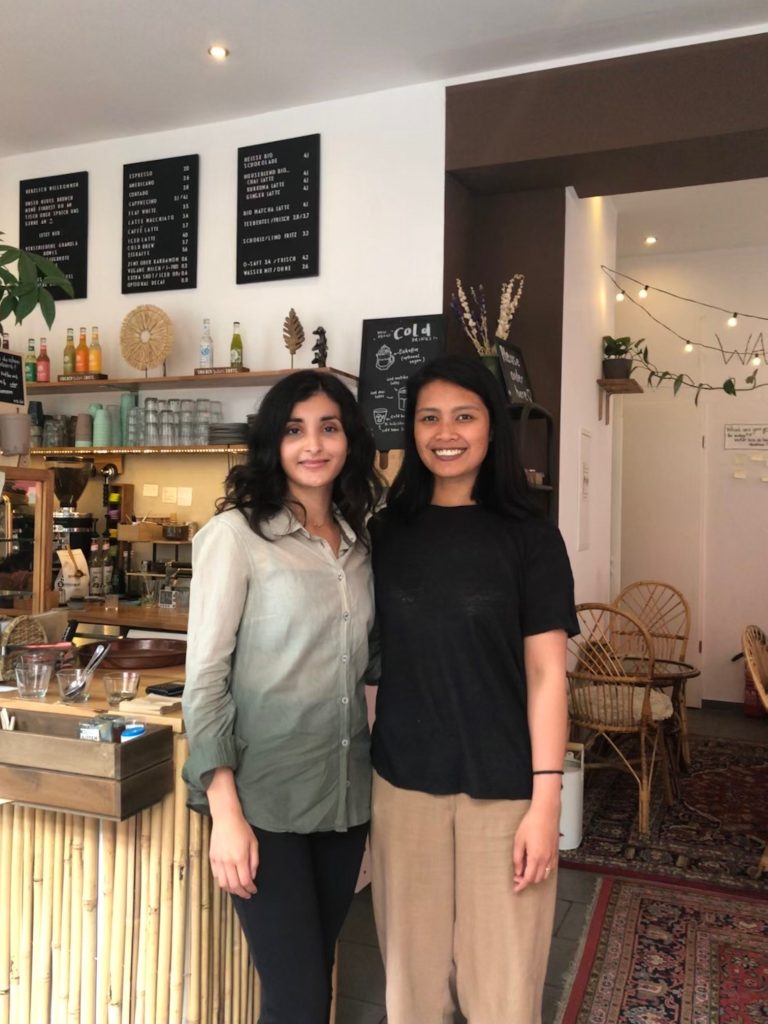
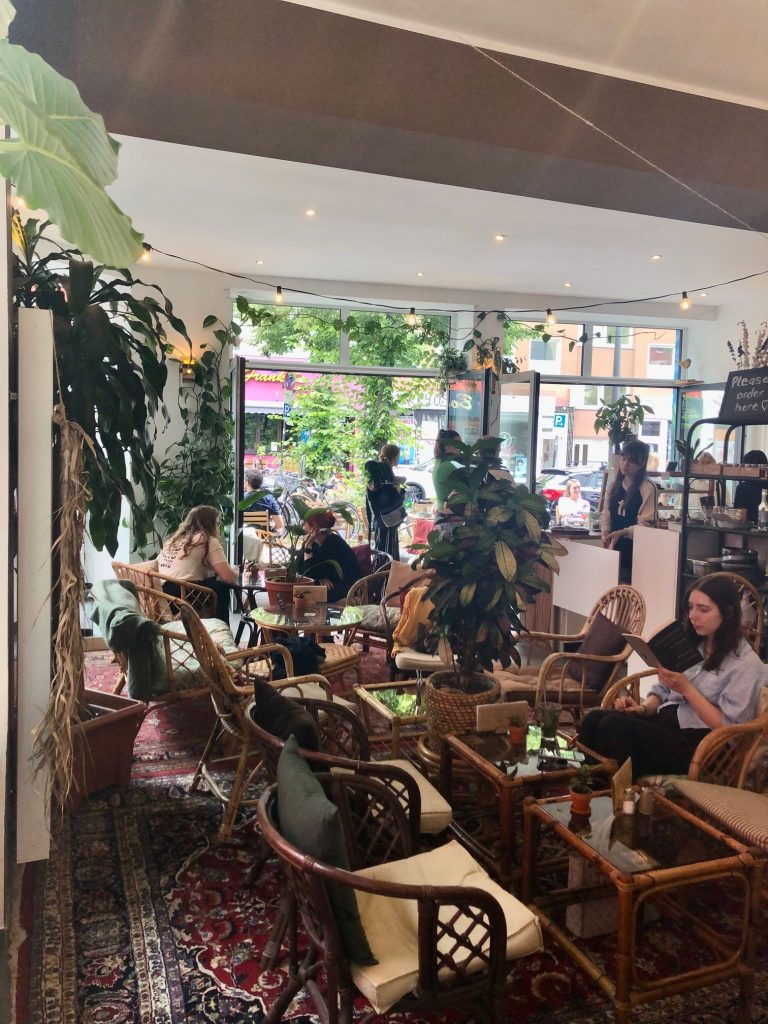
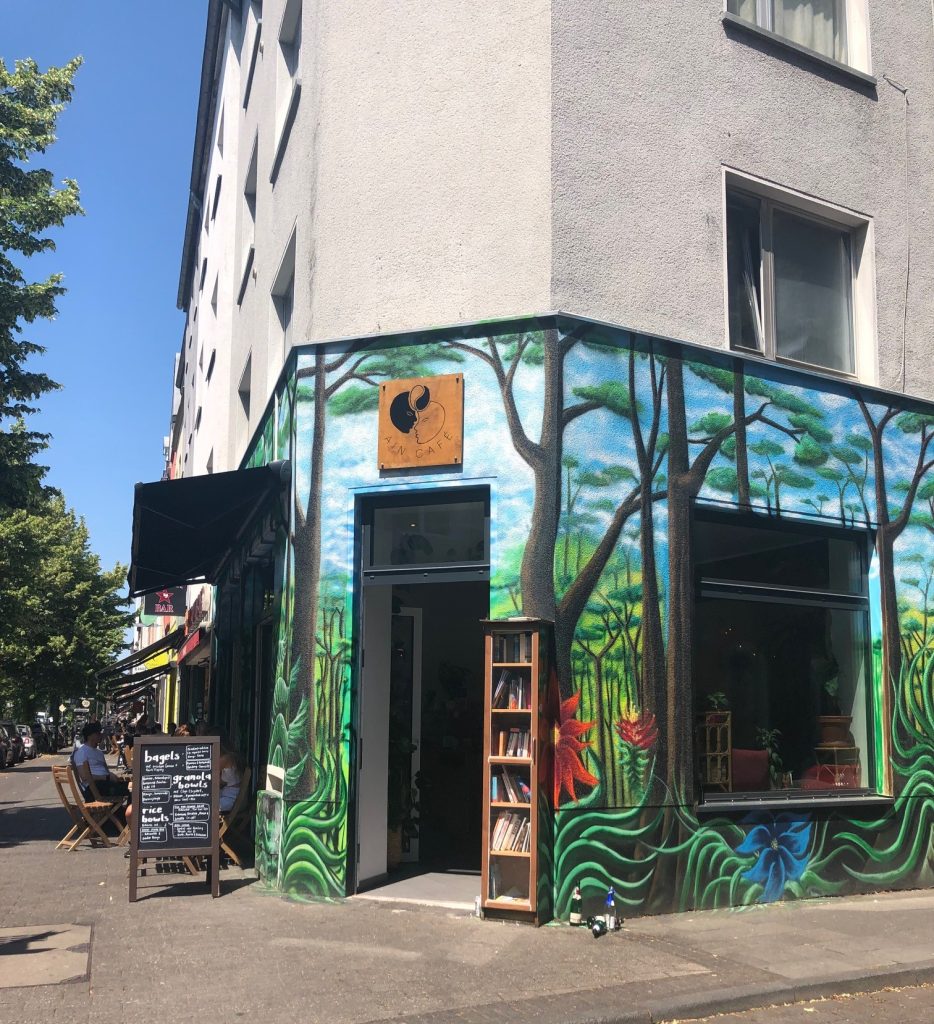
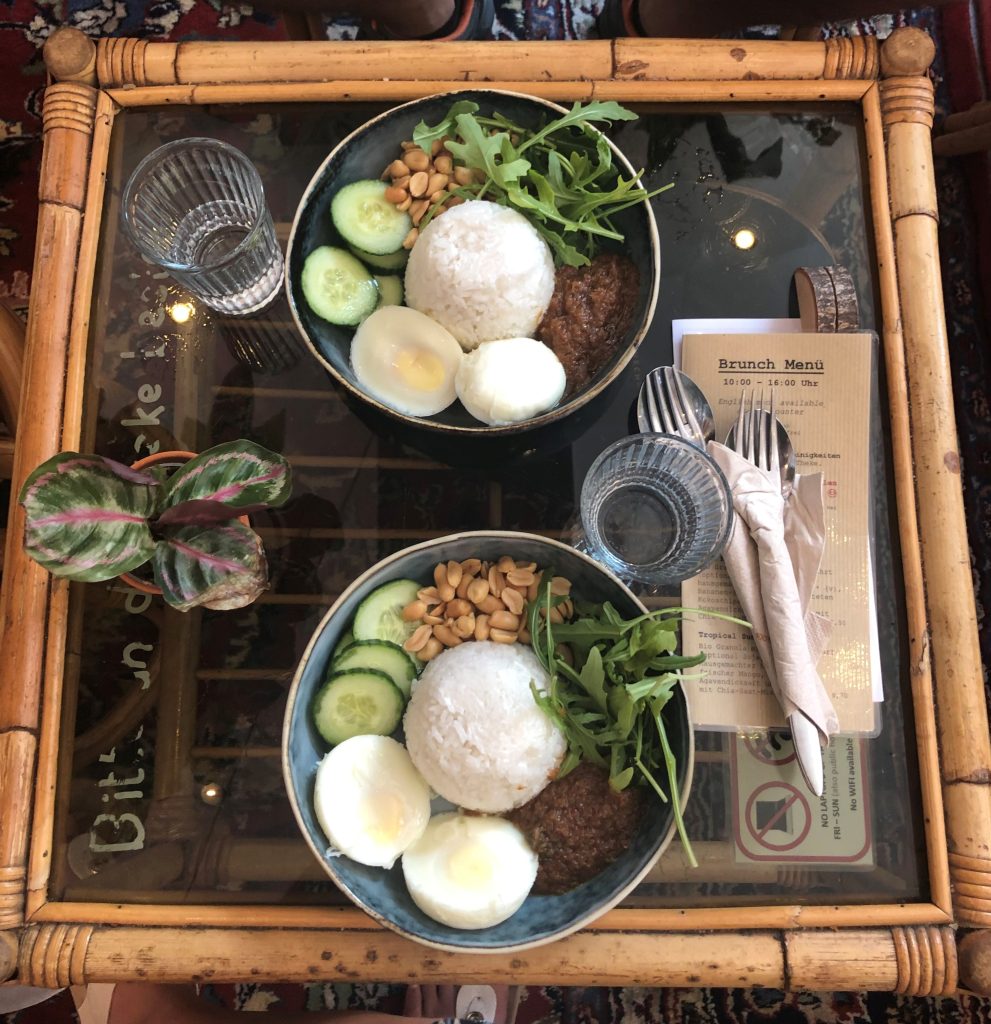
Cover photo: Tim Mossholder via Unsplash